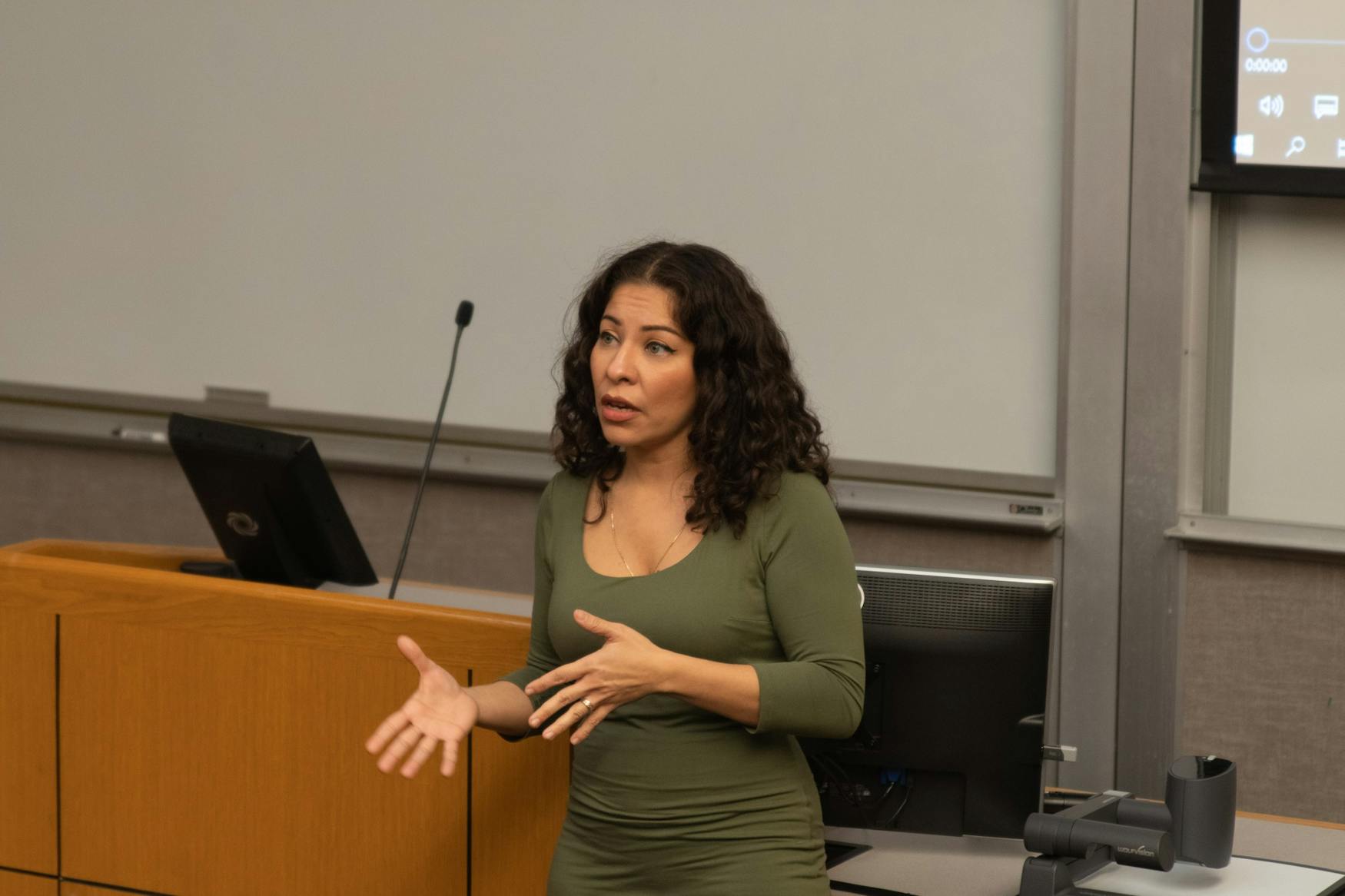Activist discusses her art installations on immigration
Michelle Angela Ortiz shared her most recent project focusing on immigration rights with the community.
Artist and immigrant rights activist Michelle Angela Ortiz spoke to the Brandeis community on Nov. 19 about her “Familias Separadas” project, a series of public art installations highlighting the plight of families affected by detention and deportation in the United States.
Works from the project are currently on display at the Institute of Contemporary Art in Boston as part of the exhibit “When Home Won’t Let You Stay: Migration through Contemporary Art.”
Ortiz began her talk by sharing that she is the daughter of Colombian and Puerto Rican immigrants, and that she still resides in the heavily immigrant-populated neighborhood in Philadelphia, Pa. where she was born and raised.
Ortiz shared that she created “Familias Separadas” in response to the increase in deportations in 2013 — an issue “so overwhelming,” she said, “the only way I thought to start was in my own city.” Partnering with the Philadelphia-based immigrant rights organization Juntos, Ortiz began interviewing and collecting stories from local undocumented families. “I always start my work with conversation,” she said.
The main goal of Ortiz’s project is to shift the conversation about deportation from numbers and statistics to the reality and humanity “of the mother, the father, husband, child … that has been torn apart from their families,” she said.
The personal stories Ortiz gathered served as the driving force behind five large-scale artworks installed in 2015 at different public locations in Philadelphia. One, which was sprawled on the concrete outside City Hall, featured an 18-foot image of a woman named Maria and her young daughter.
Maria’s husband was detained for three years before ultimately being deported back to Mexico. She and her five children continue to live in Philadelphia without him. In the background of the image are words from letters Maria’s husband sent her while he awaited deportation. His words “Eres Mi Todo,” “you are my everything,” are bolded. “What happens when what is everything to you is taken away?” Ortiz asked the audience.
Other locations of Ortiz’s works included the street outside an Immigration and Customs Enforcement building. It was there that she and a group of volunteers installed the 90-foot-long stenciled words, “WE ARE HUMAN BEINGS, RISKING OUR LIVES FOR OUR FAMILIES AND OUR FUTURE,” which were spoken to Ortiz by an undocumented mother named Ana. Many of Ortiz’s volunteers were, themselves, undocumented, so to create this installation together with them “in front of a building that represents so much fear” was very powerful, she said.
To Ortiz, making a public and prominent spectacle of what would otherwise remain private stories of undocumented families was of primary importance. “My intention is for their images to be so large that they cannot be ignored,” she said.
In 2018, Ortiz unveiled what she called “phase two” of Familias Separadas: a series of billboards and murals in Harrisburg, Pa. featuring images and direct messages of mothers formerly detained at Berks County Family Detention Center. Berks, a family prison outside Philadelphia, is where children as young as two weeks old are detained, Ortiz said. She spoke about the many alleged human rights abuses Berks has been charged with, and about efforts still being made to shut down the facility.
Ortiz based each of the eight Harrisburg installations on interviews she conducted with mothers detained at Berks with their young children. She shared details of a number of these womens’ stories and struggles, including that of Karen, who together with her six-year-old son spent 651 days at Berks before being deported back to El Salvador. An 88-foot-long image of them installed on the Harrisburg Capitol Steps stared powerful Pennsylvania policymakers in the face every day.
Although “Familias Separadas” provides a platform for the voices of these women to be amplified, Ortiz explained that, “I’m not giving the mothers a voice. They already have a voice. I’m not giving them power. I’m helping energize that existing individual and collective power that they have.”
Saul Goldstein ’23, who had read about and went to the ICA to see “Familias Separadas” as part of Prof. Toni Shapiro-Phim’s (CAST) Creativity, Arts and Social Transformation class, said the experience of hearing from Ortiz “brought to life” the issues of immigration and deportation addressed in her work.



Please note All comments are eligible for publication in The Justice.